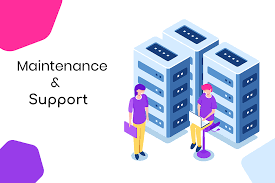While developing a mobile app for your business, you need to choose a platform to run your app. With the booming reputation of mobile platforms, plenty of technologies and frameworks have developed. It makes things simpler and smoother for the end-users. Choosing the right technology plays an important role to address your goals and get long-term success.
But if you have no idea which devices your targeted audience is using, you can opt for the hybrid app that runs on multiple platforms especially, Android and iOS. There are various frameworks to leverage for hybrid app development such as React Native, Flutter, Ionic, Xamarin, etc. Comparing cross-platform app development frameworks help you to discover the core differences among all so, you can choose based on your precise needs.
In this post, we will understand the basics of the Ionic framework and the reasons for choosing it for hybrid app development. So let’s get going.
What is Ionic?
Ionic is a classic hybrid app development framework created in 2013 as an open-source SDK. It enables developers to generate apps across all the platforms with a single and reusable codebase. Ionic has more than 5M applications already developed using it.
Ionic is widely known for offering platform-specific UI components through a native component library for iOS and Android. The open-source UI toolkit is used to build high-quality desktop and mobile apps by using web technologies like HTML, CSS, and Javascript. Ionic primarily focuses on front-end UI interaction like gestures, animations, controls, etc., along with excellent UX.
The Ionic framework can be integrated easily with different frameworks such as HTML, CSS, Angular, Vue, React, etc. It can also be used as a standalone framework.
Now, as you are clear with the basics of Ionic, let’s watch out for some of the reasons to opt for Ionic .
Why should you opt for Ionic Framework?
1. Open source and free of cost
One of the reasons people are choosing the Ionic framework is that it is an open-source framework . Open-source means free of cost. You can find different frameworks that charge you yearly for using the framework. But with Ionic, you do not need to pay a single penny for app development.
2. Platform compatibility
If you are looking to build an app that can work across all the platforms instead of focusing on native OSs such as Android, iOS, or even Windows, the Ionic framework is the way to go. You can save on time, money, and resources while choosing a hybrid language compared to a Native one statisca. The language option lets you convert your app easily from one OS to another. It is pretty easy to move on different platforms.
3. Huge community
If you are a newbie or even familiar with app development, at some point, you might need help to solve an issue. As Ionic has a massive community, you can get all the help on facing any difficulties. The community has active and skilled developers who are always ready to assist with any concerns and questions. A big community is always there to discuss your problems.
4. Cordova Plugins
Cordova is a mobile app development framework backed by Adobe Systems. The Ionic framework leverages Apache Cordova and accesses hardware as well as functionalities of the particular devices such as contacts, battery, GPS, camera, etc.
It can be done using Cordova Plugins. Cordova makes an Ionic framework capable enough to develop a highly competitive mobile app. As per your business needs, mobile app developers can leverage any of these plugins to enhance the overall performance of your app.
5. Built on Angular
Ionic is constructed on the AngularJS framework well-known to create mobile as well as web apps. Ionic leverages Angular’s advantages and also utilizes it to offer app structure.
AngularJS framework is supported by google that enables developers to build high-grade mobile apps on the Ionic platform. You can extend the HTML syntax to add your app component. Another benefit is data-binding.
6. One code for multiple platforms
The Ionic framework lets you use a single codebase for multiple platforms you want to run your app. You do not have to hire native app developers to develop apps when you choose Ionic. Single codebase mitigates overall development costs and improves versatility. You can transform your Ionic app into a desktop or PWA.
As there is no need to write code for different platforms, you have faster time-to-market. Built-in browser instruments and debugging tools help with easy maintenance.
7. Simple to use
Ionic uses web technologies that front-end developers are already familiar with. Developers either would love to work in their preferred framework or start learning Ionic’s basics. It mitigates the need to learn native coding and yet enables developers to develop apps with native functionality.
Ionic also consists of pre-built UI elements that you can edit to suit your designs as the code is reusable.
Also know about amc stocktwits.
8. An extensive list of integrations and plugins
Ionic supports a range of integrations with multiple tools for the users who want to get the best out of Ionic app development. You can improve your app quality by including more features such as a Payment system, Testing tools, Analytic tools, and Security.
Along with integrations, Ionic also supports many plugins that aid your app to integrate software and hardware components. It improves the app’s overall performance by just making tiny changes.
9. Component library
Because of the far-reaching component library, it is easy to develop Ionic applications. You can use these ready-made components to create a graphic UI or customize it as per our business needs. You can also get a base theme to develop your app that adapts exceptionally well to every platform. So it’s easy to build an app prototype within a short time frame using Ionic Creator.
Not only faster time to market, but you can also build native-looking apps for each platform.
10. Easy testing
Compared to other available frameworks, Ionic offers easy app testing as you can run your testing on a desktop browser or a simulator for iOS and Android apps.
You can also test your app on any of the smartphone browsers for Android and Safari for iOS. Utilizing all these methods helps to discover almost all the bugs. But still, to get an idea of the real-world performance, you can test the app on the actual platform it will run on. You can perform all the tests effortlessly.
11. Documentation
You will always need a proper document to get the best out of the technology you are working on. Ionic has a well-structured database that helps you easily find the information to solve the problems.
A comprehensive document of Ionic includes explanations, detailed guides, and tutorials to help you understand every component and install and configure different tools. There is no chance to get stuck at any point when you have all-inclusive documentation.
That’s not all. Ionic offers many benefits.
Extremely easy to adopt
Support Android and iOS that speed up the app development process.
Highly customizable components and themes.
Roust structure to easily manage the code.
Improved app performance.
Best designs by accessing Cordova plugins.
Summing Up
Now that you have acknowledged what Ionic is all about and why it exists. You can have many reasons to at least give a to the framework.
The Ionic technology has simplified hybrid app development while giving an intuitive look and feel to your app. From its usability to an appealing interface and remarkable native-like performance, you can develop apps your user will love.


